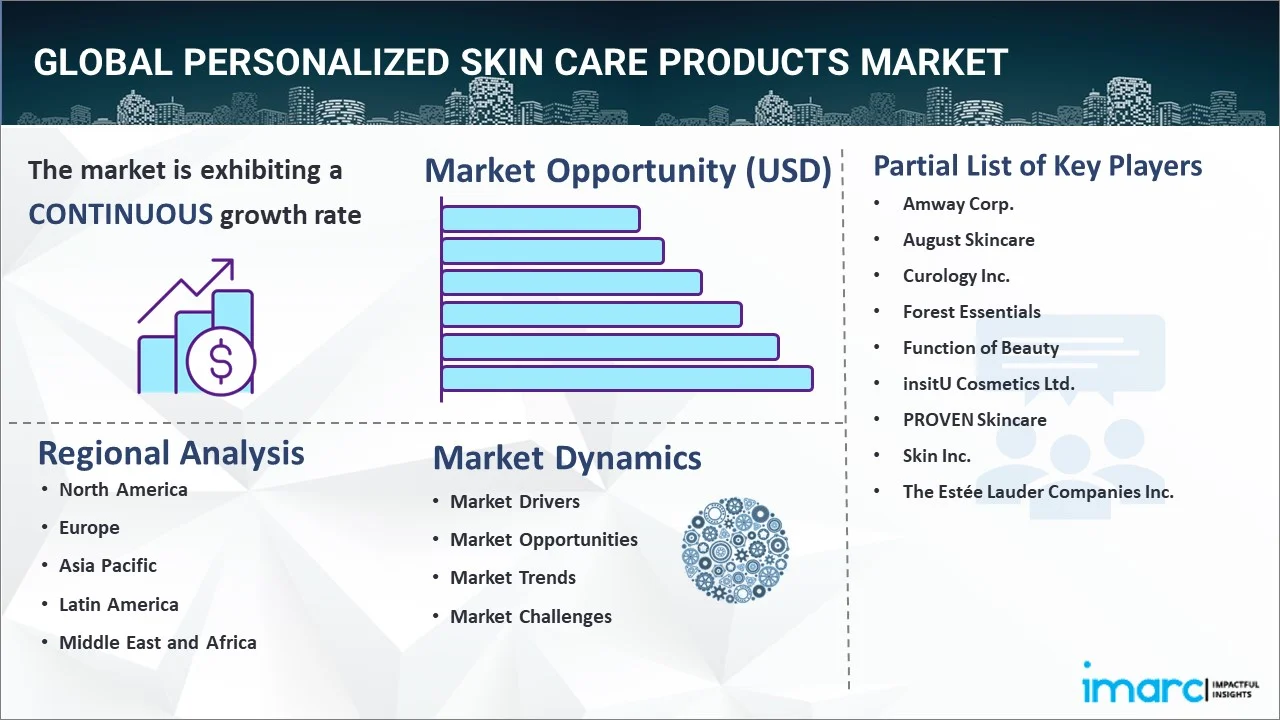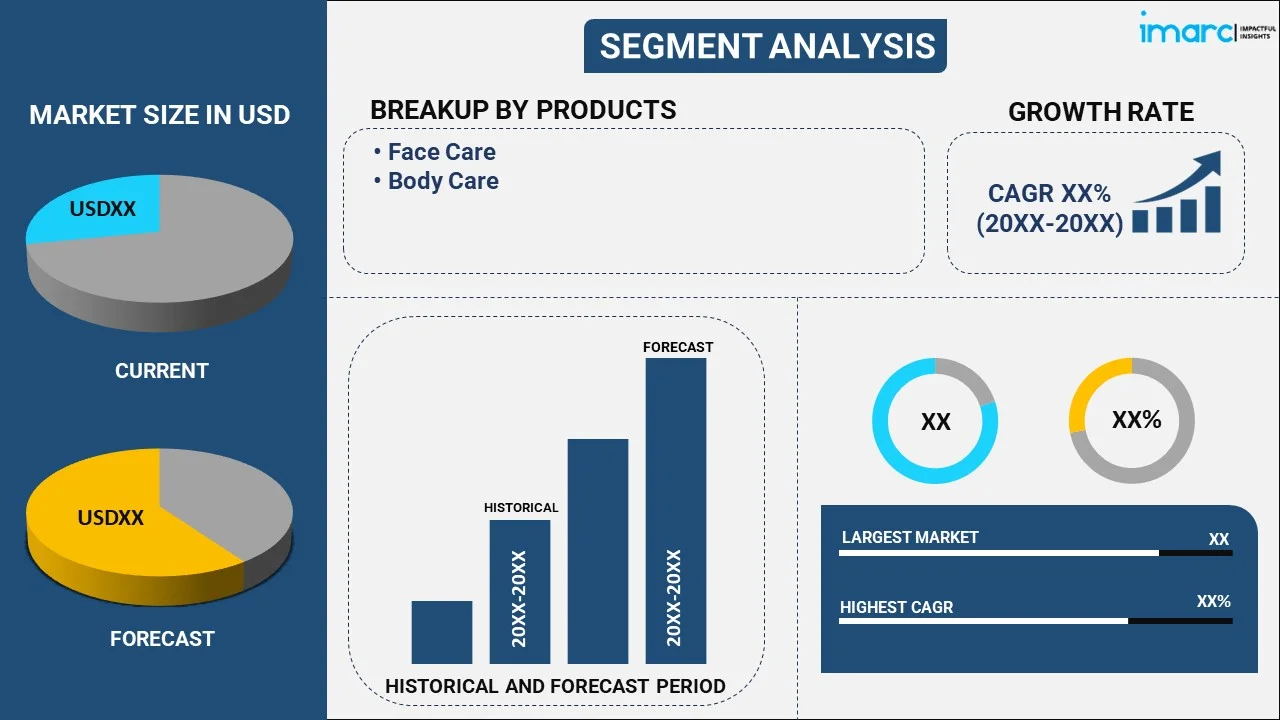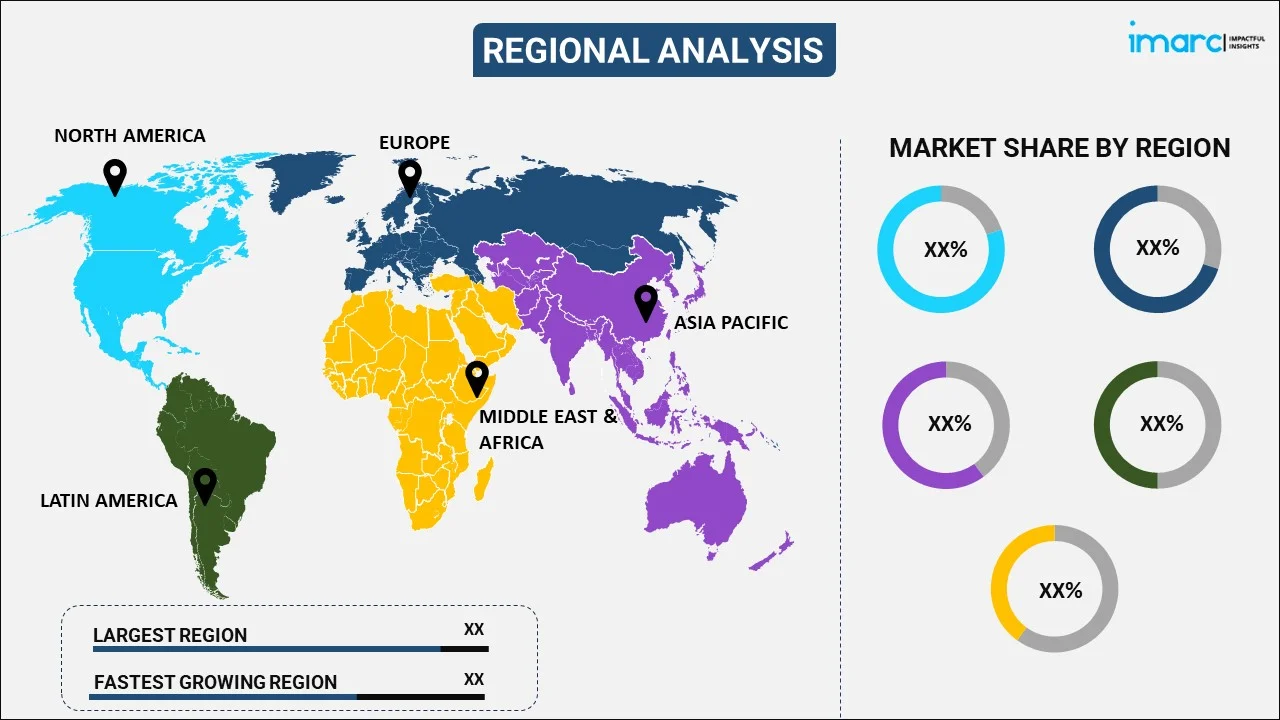
Personalized Skin Care Products Market Report by Product (Face Care, Body Care), Gender (Male, Female), Pricing Type (Mass, Premium), Age Group (Below 15 Years, 15-25 Years, 26-45 Years, 46-60 Years, Above 60 Years), Distribution Channel (Online, Offline), and Region 2025-2033
Personalized Skin Care Products Market Size:
The global personalized skin care products market size reached USD 27.2 Billion in 2024. Looking forward, IMARC Group expects the market to reach USD 39.2 Billion by 2033, exhibiting a growth rate (CAGR) of 3.93% during 2025-2033. The rising occurrence of skin-related problems, the increasing number of e-commerce businesses and luxury skincare bands, and the growing investment in research and development (R&D) activities for formulating effective and accurate skin care products are major factors impelling the market growth.
|
Report Attribute
|
Key Statistics
|
|---|---|
|
Base Year
|
2024 |
|
Forecast Years
|
2025-2033
|
|
Historical Years
|
2019-2024
|
| Market Size in 2024 | USD 27.2 Billion |
| Market Forecast in 2033 | USD 39.2 Billion |
| Market Growth Rate (2025-2033) | 3.93% |
Personalized skin care products are customized as per the skin type and concerns of an individual by a cosmetic technical manager. They comprise a wide variety of products, such as creams, lotions, serums, moisturizers, facewashes, exfoliants, face masks, and eye creams. They contain various ingredients, such as kojic acid, ascorbic acid, salicylic acid, niacinamide, hyaluronic acid, benzoyl peroxide, ceramides, and retinol. They also consist of various natural components, such as green tea extracts, licorice, witch hazel, turmeric, and bentonite clay, which help to smoothen the texture of the skin and provide a youthful glow. Personalized skin care products are capable of fulfilling the skincare goals of users with ingredients tailored to accomplish the unique requirements of their skin. They are effective in reducing wrinkles and fine lines and reversing the effects of aging on the skin. They also prevent acne formation, excessive oil secretion, and the formation of pores on the skin. Furthermore, as personalized skin care products are cost-efficient and readily available, their demand is rising around the world.

Personalized Skin Care Products Market Trends:
Increasing Investment in Research and Development (R&D)
The increasing investment in research and development is playing a crucial role in advancing the personalized skin care market. For instance, in July 2024, Pond’s Skin Institute, a brand owned by Unilever, has teamed up with Watsons to introduce a pilot program for its Microbiome Analyzer. This innovative technology can analyze a customer’s skin microbiome and deliver a customized skincare regimen for various skin types within 60 minutes. Additionally, the device works by analyzing a skin swab from the customer, along with data points derived from the brand's research and development (R&D) expertise. Based on this analysis, the device generates a personalized skin microbiome profile and suggests recommended products from the Pond’s Skin Institute range. This is helping brands cater to various skin types, concerns, and conditions. Moreover, personalized skin care products are built on the foundation of understanding individual differences in skin biology, making it essential for companies to invest in cutting-edge research to stay competitive. These investments also allow for the incorporation of advanced ingredients and technologies, such as DNA-based formulations or products designed based on a person’s skin microbiome. As more consumers seek customized solutions, R&D efforts are fueling market growth by offering scientifically-backed products that promise better results.
Rising Incidence of Skin Conditions
The increasing prevalence of skin conditions, such as acne, eczema, and rosacea, is significantly escalating the demand for personalized skin care products. According to the International Eczema Council, approximately 223 million people were living with atopic dermatitis, with around 43 million of them being children aged 1 to 4 in 2022. Various factors, including environmental pollution, changing lifestyles, stress, and diet, have contributed to the surge in dermatological issues. This has led consumers to seek more targeted and effective solutions, moving away from generic products toward personalized skin care options tailored to their unique skin needs. Moreover, personalized skin care products offer formulations designed to address specific skin concerns, making them more appealing to consumers dealing with chronic or acute skin conditions. As these conditions often require specialized treatment, products that are customized to an individual's skin type and condition provide better outcomes. This trend is prompting skincare brands to invest in research and development (R&D) to create more advanced, scientifically-backed personalized solutions. As a result, the rising incidence of skin conditions is playing a pivotal role in the growth of the personalized skin care market.
Growing E-commerce Adoption
The rapid expansion of e-commerce has significantly contributed to the growth of the personalized skin care products market. For instance, on 18 July 2023, BigCommerce, a top Open SaaS e-commerce platform for growing and established business-to-customer (B2C) and business-to-business (B2B) brands, announced that dermatologist-founded skincare brand Curology has launched a new storefront, The Curology Shop, on the BigCommerce platform. Additionally, the Curology Shop represents the brand's first move into direct-to-consumer sales for its non-prescription skincare products. Curology required an e-commerce platform that could integrate with its existing legacy systems and technology stack, while also supporting the company’s evolving business needs. Moreover, online channels are essential tools for brands to reach consumers directly, offering convenience and accessibility that traditional retail channels cannot match. This shift has allowed more people to discover and purchase tailored skin care solutions that address their specific needs. Furthermore, the digital platform enables brands to educate consumers about the benefits of personalized products through tutorials, blogs, and reviews, creating a more informed customer base. The continued rise in online shopping is expected to further expand the personalized skin care Products market share.
Personalized Skin Care Products Market Segmentation:
IMARC Group provides an analysis of the key trends in each segment of the global personalized skin care products market report, along with forecasts at the global, regional, and country levels for 2025-2033. Our report has categorized the market based on product, gender, pricing type, age group, and distribution channel.
Product Insights:

- Face Care
- Body Care
The report has provided a detailed breakup and analysis of the personalized skin care products market based on the product. This includes face care and body care. According to the report, face care represented the largest segment.
Gender Insights:
- Male
- Female
A detailed breakup and analysis of the personalized skin care products market based on the gender has also been provided in the report. This includes male and female. According to the report, female accounted for the largest market share.
Pricing Type Insights:
- Mass
- Premium
A detailed breakup and analysis of the personalized skin care products market based on the pricing type has also been provided in the report. This includes mass and premium.
Age Group Insights:
- Below 15 Years
- 15-25 Years
- 26-45 Years
- 46-60 Years
- Above 60 Years
A detailed breakup and analysis of the personalized skin care products market based on the age group has also been provided in the report. This includes below 15 years, 15-25 years, 26-45 years, 46-60 years, and above 60 years.
Distribution Channel Insights:
- Online
- Offline
A detailed breakup and analysis of the personalized skin care products market based on the distribution channel has also been provided in the report. This includes online and offline. According to the report, offline accounted for the largest market share.
Regional Insights:

- North America
- United States
- Canada
- Europe
- Germany
- France
- United Kingdom
- Italy
- Spain
- Others
- Asia Pacific
- China
- Japan
- India
- South Korea
- Australia
- Indonesia
- Others
- Latin America
- Brazil
- Mexico
- Others
- Middle East and Africa
The report has also provided a comprehensive analysis of all the major regional markets, which include North America (the United States and Canada); Europe (Germany, France, the United Kingdom, Italy, Spain, and others); Asia Pacific (China, Japan, India, South Korea, Australia, Indonesia, and others); Latin America (Brazil, Mexico, and others); and the Middle East and Africa. According to the report, Europe (Germany, France, the United Kingdom, Italy, Spain, and others) was the largest market for personalized skin care products. Some of the factors driving the Europe personalized skin care products market included the growing skin-related issues, rising focus on physical appearance, increasing demand for personalized skincare products, etc.
Competitive Landscape:
The report has also provided a comprehensive analysis of the competitive landscape in the global personalized skin care products market. Competitive analysis such as market structure, market share by key players, player positioning, top winning strategies, competitive dashboard, and company evaluation quadrant has been covered in the report. Also, detailed profiles of all major companies have been provided. Some of the companies covered include:
- Amway Corp.
- August Skincare
- Curology Inc.
- Forest Essentials
- Function of Beauty
- insitU Cosmetics Ltd.
- PROVEN Skincare
- Skin Inc.
- The Estée Lauder Companies Inc.
Kindly note that this only represents a partial list of companies, and the complete list has been provided in the report.
Personalized Skin Care Products Market News:
- In November 2023, PROVEN Skincare, a leader in personalized skincare introduced the All-In-One Personalized Serum, designed to address individual skin needs with targeted benefits. Unlike most luxury serums that focus on 1-2 key ingredients, PROVEN combines 4-5 powerful ingredients for enhanced effectiveness. Using insights from its award-winning Skin Genome Project™, PROVEN's advanced AI precisely selects the best ingredients for each customer's unique skin, offering a highly personalized and effective serum that delivers visible results.
- In October 2024, Tira, Reliance's beauty platform, introduced the global luxury skincare and haircare brand Augustinus Bader to the Indian market.
- In September 2024, Kaya Clinic, a prominent beauty brand, introduced its innovative AI-powered app. This cutting-edge mobile application provides personalized insights into skincare concerns based on individual needs, marking the first AI-driven skin diagnosis app in India.
Personalized Skin Care Products Market Report Scope:
| Features | Details |
|---|---|
| Base Year of the Analysis | 2024 |
| Historical Period | 2019-2024 |
| Forecast Period | 2025-2033 |
| Units | Billion USD |
| Scope of the Report | Exploration of Historical and Forecast Trends, Industry Catalysts and Challenges, Segment-Wise Historical and Predictive Market Assessment:
|
| Products Covered | Face Care, Body Care |
| Genders Covered | Male, Female |
| Pricing Types Covered | Mass, Premium |
| Age Groups Covered | Below 15 Years, 15-25 Years, 26-45 Years, 46-60 Years, Above 60 Years |
| Distribution Channels Covered | Online, Offline |
| Regions Covered | Asia Pacific, Europe, North America, Latin America, Middle East and Africa |
| Countries Covered | United States, Canada, Germany, France, United Kingdom, Italy, Spain, China, Japan, India, South Korea, Australia, Indonesia, Brazil, Mexico |
| Companies Covered | Amway Corp., August Skincare, Curology Inc., Forest Essentials, Function of Beauty, insitU Cosmetics Ltd., PROVEN Skincare, Skin Inc., The Estée Lauder Companies Inc., etc. |
| Customization Scope | 10% Free Customization |
| Post-Sale Analyst Support | 10-12 Weeks |
| Delivery Format | PDF and Excel through Email (We can also provide the editable version of the report in PPT/Word format on special request) |
Key Questions Answered in This Report:
- How has the global personalized skin care products market performed so far, and how will it perform in the coming years?
- What are the drivers, restraints, and opportunities in the global personalized skin care products market?
- What is the impact of each driver, restraint, and opportunity on the global personalized skin care products market?
- What are the key regional markets?
- Which countries represent the most attractive personalized skin care products market?
- What is the breakup of the market based on the product?
- Which is the most attractive product in the personalized skin care products market?
- What is the breakup of the market based on gender?
- Which is the most attractive gender in the personalized skin care products market?
- What is the breakup of the market based on the pricing type?
- Which is the most attractive pricing type in the personalized skin care products market?
- What is the breakup of the market based on the age group?
- Which is the most attractive age group in the personalized skin care products market?
- What is the breakup of the market based on the distribution channel?
- Which is the most attractive distribution channel in the personalized skin care products market?
- What is the competitive structure of the market?
- Who are the key players/companies in the global personalized skin care products market?
Key Benefits for Stakeholders:
- IMARC’s report offers a comprehensive quantitative analysis of various market segments, historical and current market trends, market forecasts, and dynamics of the personalized skin care products market from 2019-2033.
- The research study provides the latest information on the market drivers, challenges, and opportunities in the global personalized skin care products market.
- The study maps the leading, as well as the fastest-growing, regional markets. It further enables stakeholders to identify the key country-level markets within each region.
- Porter's five forces analysis assist stakeholders in assessing the impact of new entrants, competitive rivalry, supplier power, buyer power, and the threat of substitution. It helps stakeholders to analyze the level of competition within the personalized skin care products industry and its attractiveness.
- Competitive landscape allows stakeholders to understand their competitive environment and provides an insight into the current positions of key players in the market.
Need more help?
- Speak to our experienced analysts for insights on the current market scenarios.
- Include additional segments and countries to customize the report as per your requirement.
- Gain an unparalleled competitive advantage in your domain by understanding how to utilize the report and positively impacting your operations and revenue.
- For further assistance, please connect with our analysts.
 Request Customization
Request Customization
 Speak to an Analyst
Speak to an Analyst
 Request Brochure
Request Brochure
 Inquire Before Buying
Inquire Before Buying




.webp)




.webp)












